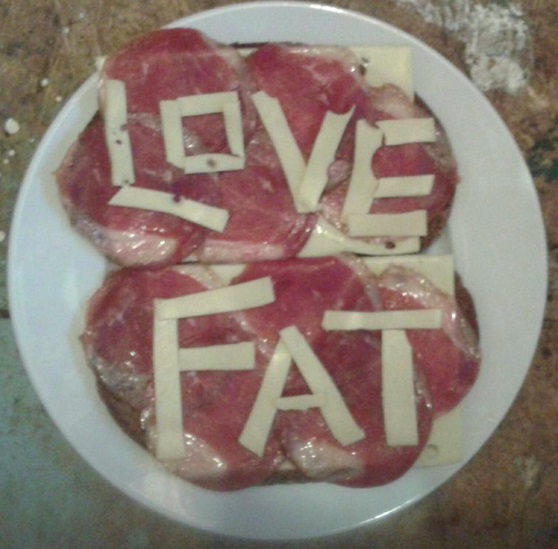In the current anti-obesity climate of the U.S., a bevy of health messages are aimed at the “obese,” exhorting the portly to lose weight, get in shape, and put down the fork. But what have fat people, or at least a subset of fat people, had to say about the relationship between food, body habitus, and eating? According to self-proclaimed fat activists, society forces fat people to diet, leading to a distorted and damaging relationship with food. As an alternative, fat activists advocate “intuitive eating,” relying on ones’ internal sensations of hunger, pleasure, and satiety to guide food consumption. This ideology, implying balance, harmony, health, and pleasure is vastly appealing – but perhaps flawed.
The fat acceptance movement began in 1969 when William Fabrey started the National Association to Aid Fat Americans (NAAFA). The organization claimed that being fat – their preferred term – was not as bad for one’s health as the public was led to believe, and that for many fat people weight loss was not a viable option. The organization sought to provide fat people with a political voice and social opportunities, as well as respite from society’s anti-fat prejudice. The movement grew to include a diverse array of fat activists, most notably fat feminists, espousing many different viewpoints on the nature of fatness and the relationship between fatness and health.
Members of the fat acceptance movement disavow the commonly-held notion that obesity is simply a matter of gluttony, instead emphasizing the role of genetics in the development of corpulence. To the extent that fat people develop disturbed eating habits, fat activists claim it is the result of anti-fat stigma and dieting. Treated as outlaws for dining in public, and vilified by horrified fellow-shoppers who snatch cookies from their shopping carts, fat people are made to feel like criminals when they eat. Food becomes an illicit substance, and eating a dangerous subaltern affair. Many fat activists feel that fatness is treated as a sickness and a sin, and dieting is a form of humiliating punishment. According to members of the fat acceptance movement, dieting can lead to an obsessive and unhealthy relationship with food. As dieters become more and more deprived, the overwhelming physiological sensation of hunger drives them to eat, indeed, to binge. Pointing to the Ancel Keys’ starvation study of the 1940s, they claim restrictive dieting can distort one’s relationship with food and drive even the most disciplined people to desperate measures.
How would members of the fat acceptance movement like to eat? Fat activists describe some of their most liberating moments involving food – a group of ten fat women going to a restaurant and eating as much as they wanted in public, getting together and eating without embarrassment. Beyond wanting the freedom to enjoy food and sociability without shame, fat activists also described wanting a more natural relationship with food, based on intuitive eating. Ideally, fat activists would like to eat when they are hungry and stop when they are full, relying on their bodily sensations to dictate what food is the most appropriate and when.
While this ideology is tremendously appealing, it falls prey to the same flaw as many dieting ideologies. Both make eating an individual matter. The implication of intuitive eating is that our bodies hold some innate truth or knowledge about what we need, and this knowledge is separable from our cultural and social context. Study after study on the psychology of eating, however, has demonstrated that subtle manipulations in the food environment (such as plate size, social cues, background music) alter how we perceive hunger and satiety. Simply put, sensations of hunger, pleasure, and satiety, can never be separated from the environment in which they are experienced.
Likewise, restrictive diets make the question of how to eat an individual, rather than a social, problem. With a strict emphasis on calories in and calories out, food is reduced to a numerical abstraction that should be under absolute personal control. Yet, the failures of weight loss diets over the past hundred years suggest dieting is not as simple as a basic mathematics equation. We still don’t fully understand why people eat what they do but we do know that eating habits are deeply rooted in community, culture, and custom. Any proposal for an ideal mode of consumption must balance internal drives with these powerful external motivators.
Intuitive eating can still be a goal – and it certainly holds more appeal than rigorous calorie-counting and fat-shaming – but somehow our food environment must be changed to support satisfying and healthful choices. Moreover, we have to support healthful eating without denigrating fat people and robbing them of the pleasures of food.

Kenneth Wachtel says:
I sincerely hope that Kathleen can make a difference in helping to achieve fat acceptance for both fat people and fat admirers. since extremely fat people and FA’s are quite rare in the general population. This makes it easy to ostrasize and bully these people and they have few places to go for support. With few exceptions the medical profession joins the bullies. I can only wish that Kathleen helps in bringing positive changes.